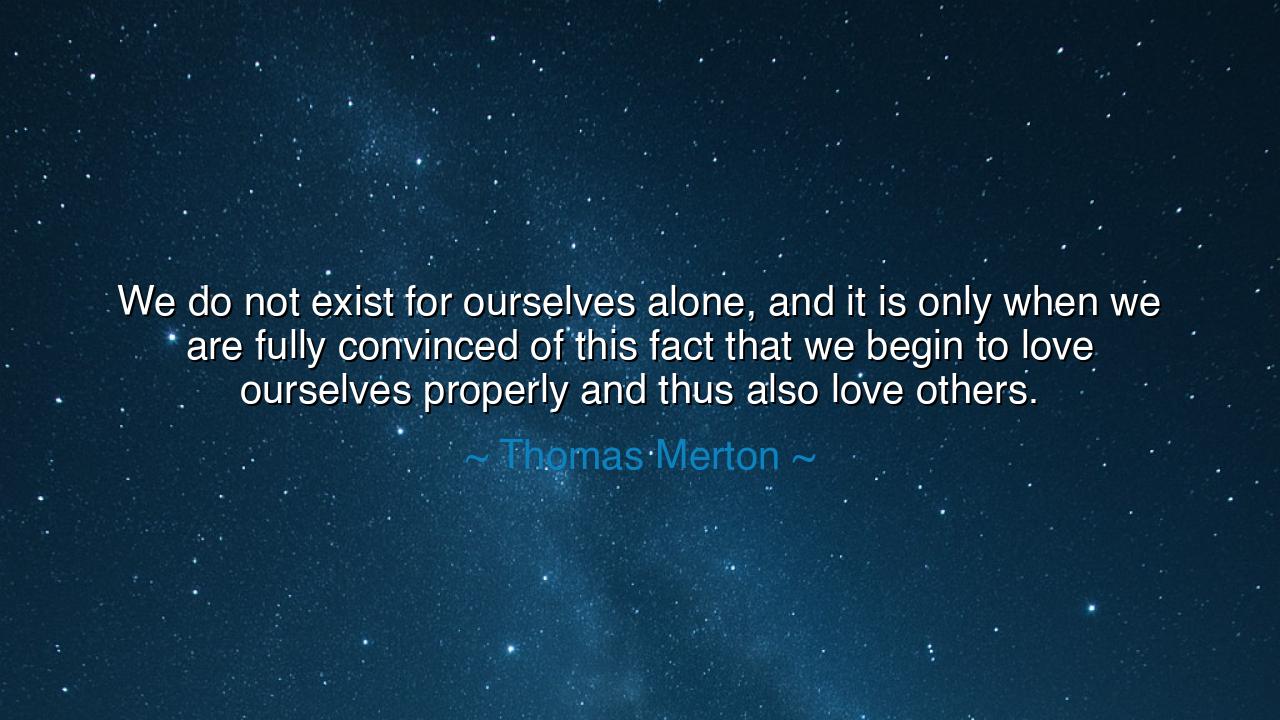
We do not exist for ourselves alone, and it is only when we are
We do not exist for ourselves alone, and it is only when we are fully convinced of this fact that we begin to love ourselves properly and thus also love others.






When Thomas Merton wrote, “We do not exist for ourselves alone, and it is only when we are fully convinced of this fact that we begin to love ourselves properly and thus also love others,” he was speaking from the depth of a soul that had gazed long into silence and come back with truth. His words rise like a sacred bell through the noise of the world — a reminder that life is not a possession, but a participation, and that the self finds its meaning not in isolation, but in connection. In these few lines, Merton reveals the eternal mystery of love: that one cannot truly love oneself without loving others, for our lives are threads in a single tapestry, woven by the same divine hand.
Merton was a Trappist monk, a contemplative who lived much of his life in solitude at the Abbey of Gethsemani. Yet from that solitude, he came to understand the profound unity of all beings. He did not speak as one who fled the world, but as one who had come to see it clearly. His writings — born from prayer, meditation, and struggle — remind us that even in silence, we are never truly alone. The hermit who prays in a cell and the mother who tends her child are bound by the same truth: the self exists not for its own sake, but for the sake of others. When Merton says we must be “fully convinced” of this fact, he is teaching that love begins in awareness — the awareness that we belong to one another.
To love ourselves properly, as Merton writes, is not to indulge our vanity or feed our desires. It is to recognize in ourselves the reflection of the divine — that sacred image that also lives in every other person. When we understand that our life’s value comes not from what we take, but from what we give, then we cease to be prisoners of selfishness. We begin to see our joy in the joy of others, our peace in their peace. This is the transformation Merton speaks of: when the heart turns outward, it finds its true center; when we love others, we return home to ourselves.
The ancients knew this law of life. Marcus Aurelius, the philosopher-emperor, wrote that “what is not good for the hive cannot be good for the bee.” He too saw that existence is communal, that the welfare of one depends upon the welfare of all. A man who seeks only his own good destroys himself, for he tears the fabric of being to which he belongs. Likewise, St. Francis of Assisi lived this truth with luminous simplicity. He called the birds his brothers, the sun his companion, the leper his friend. In his joy and poverty, he proved that to love others is the highest form of self-love, for in loving, one becomes whole. Merton stood in that same spiritual lineage — the lineage of those who understood that humanity is one great body, and every soul its living cell.
History offers us another example: Nelson Mandela, who spent twenty-seven years in a cell, separated from his people, yet never ceased to love them. When he emerged, he chose reconciliation over revenge, unity over division. In that choice lay his greatness. He understood, as Merton did, that the self is healed through compassion. Mandela could have remained bitter and broken, but by giving his love to those who had wronged him, he found his freedom. His life stands as a living echo of Merton’s truth: we cannot love ourselves unless we love others, for the two are one and the same.
Merton’s words also speak to our age — an age of isolation and illusion, where many seek happiness in possessions, recognition, and power, yet feel emptier than ever. The reason is simple: when a person lives only for themselves, they cut the roots that nourish the soul. Love, meaning, and peace grow only in connection — in the giving and receiving between hearts. The one who serves, who listens, who forgives, who lifts another’s burden, discovers a strength greater than pride, a joy greater than pleasure. This is not weakness, but wisdom — the ancient law of interdependence that binds all creation together.
So, my children, let this be your lesson: you do not exist for yourself alone. Your life is part of a great and living whole — a circle of souls stretching beyond time and space. To live rightly is to live for others; to love others is to love the divine spark within yourself. Do not confuse selfishness with self-love — for true self-love is compassion. Seek not only your own peace, but the peace of those around you. Serve not only your own joy, but the joy of the world. In doing so, you will discover what Merton knew: that the greatest freedom is found not in independence, but in interconnection — the sacred bond that unites all hearts in one divine harmony.
And remember, as Thomas Merton teaches: “We do not exist for ourselves alone.” The moment you truly believe this, the walls of isolation will crumble, and love — the oldest force in the universe — will flow through you like a river returning to the sea. In that love, you will find yourself, and in finding yourself, you will learn at last what it means to live.






AAdministratorAdministrator
Welcome, honored guests. Please leave a comment, we will respond soon